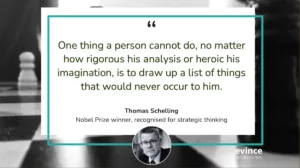
Thought Leadership: Generally speaking, I am an optimistic person with regard to the future. However, three trends are now converging that are seriously challenging my outlook on the future. The first and nearest term trend is the rise of authoritarian political regimes around the world, including the U.S. The second trend is the rise of artificial intelligence. The third is the continuing and growing problem of climate change. What concerns me is that not even the smartest people in the world can comprehend how any one of these trends will play out in the long run. The reason they cannot is captured in the above quote–no one can understand all of the things that might never occur to them, and what I now fear is that a number of things “that never occurred” to these smart people will, in fact, begin occurring. The situation will likely grow even more unstable as each of the aforementioned trends influences the other trends and creates a series of strange, wild and utterly unexpected cascading effects. I wish I had sounder advice to provide but, at this stage, I encourage everyone from the lone individual to the largest institution to work on building up “resilience.” This is to say that now is the time to ask–and answer–this question: What skills and traits must you absolutely possess if–and when–things go awry in the world of tomorrow?
Think Fast: Riders are adopting Waymo robotaxis at increasing rates. The latest data out of Austin, Texas, showed that Waymo robotaxis made up about 20 percent of Uber rides in the last week of March. As the company begins to expand to other cities and more riders become comfortable with autonomous vehicles–as it is already safer than human drivers–expect to see the transportation industry transformed very soon. I caution you to consider both the positive implications (i.e., safer experiences, fewer people owning cars, etc) and the negative implications, such as millions of Uber drivers losing their income.
Think Smaller: Eli Lilly said clinical results of a GLP-1 daily pill may be as effective as Ozempic and injectable drugs. The drug, if approved, will allow sufficient amounts to meet the high demand and would lower costs, making it available to millions more people. This could also lead the way to other drugs, such as insulin, being created into a daily tablet, lowering prices and increasing accessibility for those with diabetes and other diseases that require expensive injectable medication.
Think Long Term: Which is the better for the environment: Fossil fuels or mining critical minerals? Moving away from fossil fuels is critical to slowing climate change, but mining for minerals can also have an environmental and human impact. This may lead some to think we should stick with the status quo, however, solar panels and wind turbines only require a fixed quantity of metals to be built, and once built, can produce energy for several decades without additional inputs and have the potential to be much less harmful in the long run. The visual below should offer some “food for thought”:
Think Different: A college degree requirement for many jobs may soon be a thing of the past. Recently, Palantir Technologies launched a “Meritocracy Fellowship” for recent high school graduates who want to avoid the debt and “indoctrination” of colleges. The four-month fellowship pays $5,400 a month and will offer a full-time role to those who successfully complete the internship. While the position still requires applicants to have an SAT score of 1460 or an ACT score of 33, Palantir Technologies is offering a different way for recent graduates to learn and is just one example of the trend towards companies prioritizing skills and experience over traditional credentials.
Think Twice: 10,000 acres of farmland are contaminated with PFAS. For years, a textile mill in South Carolina gave its sewage sludge as free fertilizer. Unfortunately, now the land–which still is growing food–is full of “forever chemicals.” This is likely the tip of the iceberg. It has been estimated that anywhere between 20 and 70 million acres of farmland in America have been contaminated with PFAS.
Thought from Beyond: I spend a great deal of time just thinking but recently, I have begun rereading the ancient Christian mystic classic, “The Cloud of Unknowing.” At its heart, the book is about contemplation. One of the key concepts is this counter-intuitive idea: The deepest of all spiritual realities (knowing God) cannot simply be obtained by acquiring more worldly knowledge. Instead, “unknowing”–or letting go of our existing thoughts, ideas, concepts, and even our physical senses–offers a different path to those seeking an understanding of the Divine Source.
Afterthought: Revelation is not knowledge, it is power. The power to transform.
